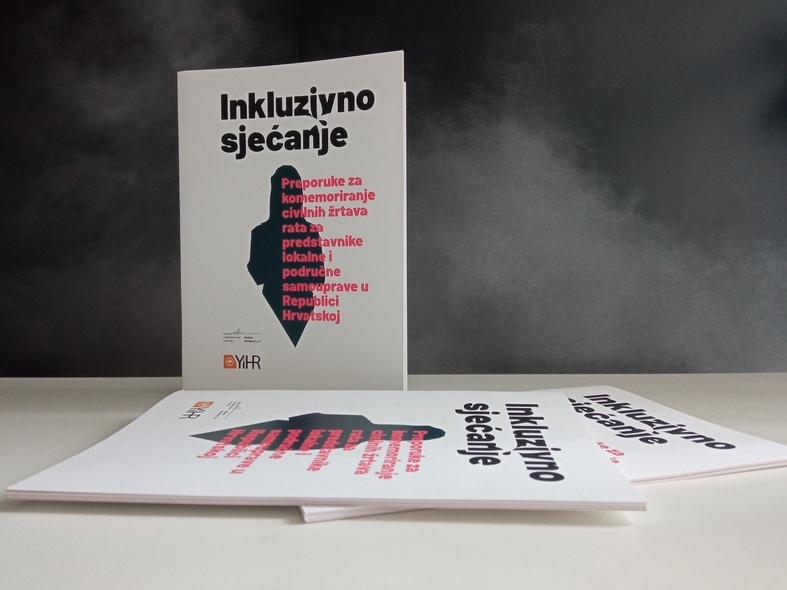Zagreb, December 22, 2022
The importance of remembering civilian war victims alongside the guidelines and examples of good practices in commemorating civilian victims of war are integral parts of the publication "Inclusive Memory: Recommendations for Commemorating Civilian Victims of war for Representatives of Local and Regional Governments in the Republic of Croatia".
This publication, issued by the Youth Initiative for Human Rights, aims to encourage local authorities to actively engage in preserving the memory of all civilian victims of war, regardless of their national origin or ethnicity.
"Inclusive memory" provides a coherent and concise presentation of international acts and examples of good practices in the regional context. It also proposes a concrete conceptual design for a monument commemorating civilian victims of war.
This publication explains the importance of preserving the memory of civilian war victims, considering that a society that does not face the past cannot realize the rights to truth, justice, reparations, and the guarantee of nonrecurrence. It is emphasized that memory is a form of reparations, given that recognition of human rights violations is necessary to restore the dignity of victims.
The chapter "How to remember the past" highlights the need for opening a dialogue in society, involving various actors, including representatives of the government, approaching memory in an inclusive manner and connecting it with contemporary topics.
In addition to creating space for the contributions of representatives of victims of human rights violations, we highlight the importance of involving the wider society in order to build trust and a future in which crimes are not repeated.
The role of government representatives is particularly significant in view of the influence that official and public recognition of crimes and the responsibility of institutions can have in the process of establishing the truth, accepting the facts, and assuming responsibility.
Accordingly, last year, on the eve of the 30th anniversary of the murder of Aleksandra, Marija, and Mihajlo Zec, the Youth Initiative for Human Rights delivered the publication Inclusive Memory to the Mayor of the City of Zagreb, Tomislav Tomašević. In 2021, the mayor took part in the commemoration of the Zec family in Sljeme for the first time. In his speech, he emphasized that "such crimes must not be forgotten".
In addition to the mayor of the City of Zagreb, recommendations were also submitted to other units of local and regional self-government in the Republic of Croatia.
In addition to representatives of the victims, wider society, and representatives of the government, the contribution of artists in the process of remembering civilian victims of war is recognized. With this in mind, the Youth Initiative for Human Rights announced a competition for a conceptual design for the commemoration of civilian war victims, which was won by a young artist, Isabell Radešić, with her conceptual design "Fragments".
We have included this accessible, impressive, feasible, and permanent conceptual design for a monument to civilian victims of war in the publication "Inclusive memory" and we advocate its installation to the representatives of local and regional self-government.
Isabella's solution "Fragments" is also available in a virtual format that follows the social media posts of the Youth Initiative for Human Rights related to the commemoration of civilian war victims. We also printed the "fragments" on a reflective card/badge so that when we go to the unmarked places of suffering together with the activists, we wear that badge as a sign of solidarity and remembrance.
Through the publication "Inclusive memory" we explain the necessity of connecting the memory process with the present and the future, recognizing the role of memory in healing and building trust, as well as facilitating the understanding of contemporary problems with the aim of preventing future violence.
With this in mind, by presenting the publication "Inclusive memory" at the panel discussion on Innovative practices of social activism and advocacy at the local level, we went beyond proposing public policies related to the commemoration of civilian war victims. We connected this topic to current problems related to human rights, more precisely climate issues that are a threat to everyone, regardless of nationality, race, or any other identity.
We invite all those interested to read the publication "Inclusive Memory: Recommendations for Commemorating Civilian War Victims for Representatives of Local and Regional Governments in the Republic of Croatia" via the following link and learn in detail how and why to remember civilian victims of war.
------------------------------------------
Project 4O: Discovery, Awareness, Empowerment, and Organization for Human Rights is supported through the Fund for Active Citizenship, with funds from Iceland, Liechtenstein, and Norway within the framework of EEA grants.
Project 4O: Discovery, Awareness, Empowerment, and Organization for Human Rights is jointly implemented by the Youth Initiative for Human Rights - Croatia, Civil Rights Project Sisak, European Home Vukovar, Status M, and ARTERARIJ.
The presentation of the recommendations was co-financed by the City of Zagreb.
